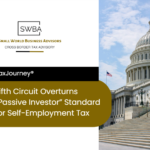The One Big Beautiful Bill Act (P.L. 119-21) marks one of the most consequential tax shifts in recent years, especially for private equity stakeholders.
From deal structuring and investment strategy to cross-border planning and compliance, this legislation introduces reforms that demand a fresh look at how capital is deployed and returns are realized.
Whether you’re a fund manager, family office, or portfolio company, understanding these changes is no longer optional, it’s essential.
Here are the key provisions every private equity stakeholder should be tracking:
1. Business Interest Limitation IRC §163(j): The Act reinstates the EBITDA-based method for calculating Adjusted Taxable Income (ATI), improving interest deductibility on leveraged buyouts and debt-funded deals. Starting in 2026, select foreign income exclusions will apply, further impacting interest deductibility.
2. 100% Bonus Depreciation & R&D Expensing: Portfolio companies can now fully expense capital investments upfront, boosting liquidity and cash flow. Domestic R&D costs are deductible in the same year, supporting innovation-driven businesses.
3. QSBS Expansion: QSBS benefits are significantly enhanced with higher exclusion thresholds and a tiered structure, making early-stage investments more tax-efficient and elevating VC-style strategies within private equity.
4. Carried Interest Treatment Remains Unchanged: Carried interest retains its long-term capital gains classification, preserving after-tax returns for fund managers and GP teams.
5. Gift & Estate Tax Exemption Increases: Higher exemption thresholds allow HNW LPs and fund principals to transfer wealth more efficiently, offering greater flexibility in estate planning.
6. International Tax Updates: OBBBA aligns U.S. international tax rules with global standards, streamlining treaty benefit claims and improving clarity for cross-border private equity investments.
7. Disguised Sales & Partnership Rules: The Act broadens the scope of taxable disguised sales, requiring LPs to reassess partnership allocations and exit strategies to avoid unintended tax exposure.
8. Excess Business Loss (EBL) Limitations: EBL limitations are now permanent, standardizing how portfolio-level losses are offset and enabling more confident long-term tax planning.
These reforms are more than technical, they’re strategic. They influence how capital is deployed, how returns are realized, and how tax impacts the private equity lifecycle.
The information contained in this post is merely for informative purposes and does not constitute tax advice. For more information, feel free to reach us at [email protected]
Copyright 2025 Small World Business Advisors LLC www.swbadvisors.com













